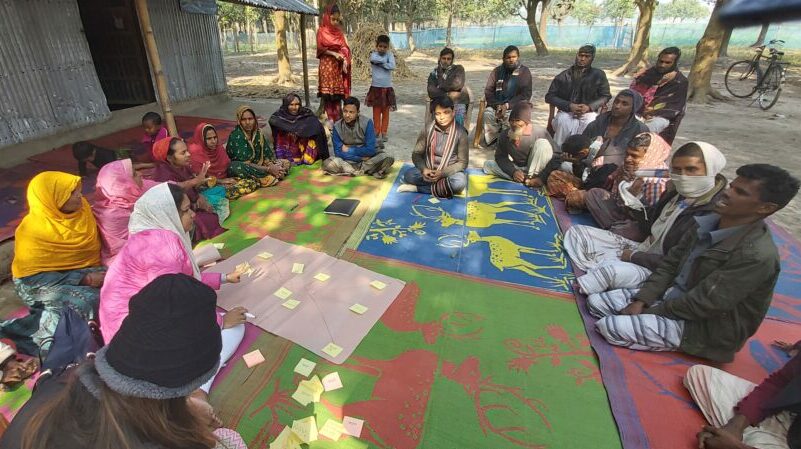It is past time to advance a progressive US advocacy agenda on climate-forced displacement. For leaders working in climate policy, the political administration turnover provides an opportunity to see real change.
“There’s no international legal instrument to protect the rights of those who are displaced by climate change. The US has the opportunity and responsibility to lead this effort, through its diplomatic relations, its engagement in multilateral policy spaces, and through its economic influence and power,” remarks Salote Soqo.
As senior partnership officer for climate justice and crisis response at the Unitarian Universalist Service Committee (UUSC) and a member the Council of Advisors for the Climate Justice Resilience Fund (CJRF), Soqo leads an advocacy coalition that is working to engage the Biden administration and raise awareness about the many impacts of climate injustice and critical solutions put forward by impacted communities.
UUSC is an international human rights organization committed to dismantling systems of oppression and advancing human rights. In the United States, UUSC works in partnership with Indigenous communities who are forcibly displaced by the impacts of the climate crisis to advance just, equitable and human rights-based solutions to address climate-forced displacement.
In a letter to the Biden Administration, UUSC and partner organizations, including the CJRF, applauded President Joe Biden’s Executive Order on Rebuilding and Enhancing Programs to Resettle Refugees and Planning for the Impact of Climate Change on Migration. The Executive Order, signed by President Biden on February 4, 2021, solidifies the US government’s commitment to provide a safe haven to the world’s refugees and take seriously the effects of climate change as a driver of migration. UUSC welcomed the “monumental shift in federal policy”.
This same letter also calls on the US government to “pay attention to the internal displacement that is happening within its borders” and points to the disproportionate burdens that the climate crisis has placed on Indigenous people and people of color in the United States.
“We’re committed to helping the administration understand how this issue is affecting our partners on the ground and to help amplify the advocacy our partners are leading,” Soqo shared.
Similarly, ActionAid USA and its global federation, ActionAid International, have issued a call to action for the US administration to reclaim America’s climate leadership. ActionAid International is one of the few organizations involved in both climate and immigration advocacy movements. For the past several years, the organization has been engaged in pioneering work on climate and migration in South Asia, where over 9.5 million people have been displaced in 2019 due to disasters. They hope the research and learning from regional policy engagement will contribute to the development of a globally-informed policy agenda in the United States.
Brandon Wu is the Director of Policy and Campaigns for ActionAid USA. The DC-based organization focuses on the core issues of climate justice, food systems, agriculture, and land rights.
Wu says the biggest problem is that many organizations don’t have the capacity to work on the nexus of climate and immigration advocacy. CJRF’s $200,000 grant supports ActionAid USA’s work to build bridges between the two movements.
“We need to start thinking about climate-induced migration as an issue. If we don’t start now, we’re going to be in trouble,” Wu shared.
Both Wu and Soqo say it is critical to raise political awareness and consciousness of how climate change can displace people.
“Climate-induced migration is one of the issues that illustrates how badly we need international cooperation to solve these problems,” Wu said. “We certainly want the Biden administration to play a more constructive role in those negotiations.”
“We’re calling on the federal government to fulfil its duty of care and responsibility to protect its communities, especially those who are forced out of their homes by the impacts of climate change,” Soqo shared.
Soqo says the time is ripe to work with the US government on this issue. “We have an opportunity now because of this new administration and the political will through the executive order to take action.”
She adds: “The United States government should have addressed this a long, long time ago.”
UUSC recently contributed to a report to inform policy makers on this topic and aid in decision making. The report is designed to inform a climate justice report requested by President Biden as a centerpiece of the Executive Order mentioned above.
This post was sponsored by the Climate Justice Resilience Fund. See our editorial guidelines for what this means.
